How do you memorise an entire symphony?
- Published
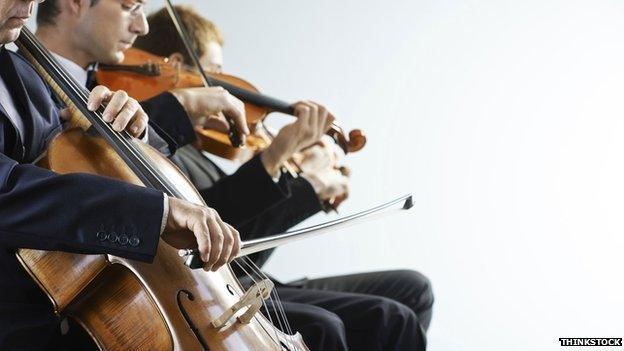
In a feat of musical memory, the Aurora Orchestra will perform Beethoven's Pastoral Symphony without printed scores at the BBC Proms 2015. Neuroscientist Jessica Grahn explores how musicians manage to remember highly complex arrangements.
The extraordinary ability of musicians to recall millions of musical notes over a lifetime is undoubtedly one of the most impressive feats of human memory.
For scientists, such feats provide an opportunity to understand how human memory works - but, for musicians, having to achieve this on a regular basis can be terrifying.
Most musicians will have to perform from memory at some time in their career. Some, especially singers or soloists, have to perform from memory most of the time.
Feelings about the practice are divided. Some musicians feel that performing without a score allows them to be freer and more expressive. Others feel that memorisation is time-consuming and less reliable than using a written score.
Moreover, the fear of memory "slips" can hamper expressive performance, or worse. Debilitating stage fright may cause a musician to withdraw from the profession entirely.
Most ensembles escape the burden of memorisation - with notable exceptions being the Kolisch Quartet in the 1930s and the Chiara and Zehetmair Quartets today. An entire orchestra playing from memory, as the Aurora Orchestra will do this summer at the Proms, is all but unheard of.
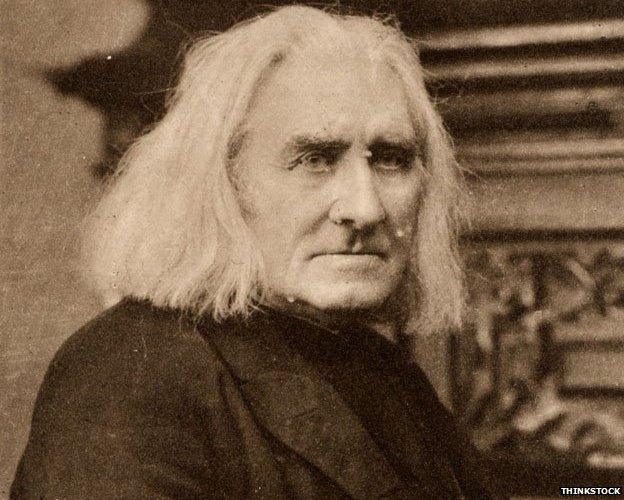
Franz Liszt - one of the trendsetters
Musicians with a hatred of memorisation may bemoan Clara Schumann and Franz Liszt, who were among the first 19th Century musicians to spark this trend.
The image of a piano virtuoso was beginning to form at this time, with Liszt declaring that "virtuosity is not an outgrowth, but an indispensable element of music".
Before this time, it was considered arrogant to perform without the score.
Beethoven explicitly disapproved of one of his pupils, who could play the composer's entire set of works from memory, as he was concerned that important details in the score could be missed.
Chopin was angered when he heard that one of his pupils wanted to play him a Nocturne from memory. Mendelssohn had an amazing musical memory, but would not let on - before one performance when his score was unavailable, he had a page-turner place a random book in front of him and pretend it was the score.
However, prior to the Renaissance, playing from memory was a necessity, as little or no musical notation was available.

Clara Schumann - the female virtuoso
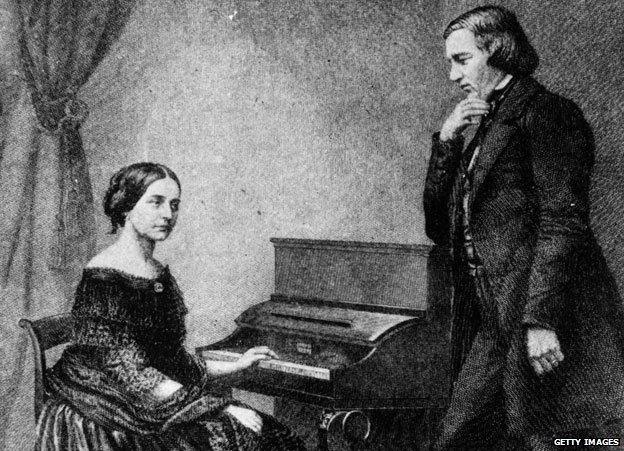
With her husband Robert Schumann
A German musician and composer, born in 1819
She was a child prodigy, trained by her father, the renowned music teacher Friedrich Wieck
By the age of nine she played public piano concerts, and as an 11-year-old she toured Paris playing solo recitals
Married the composer Robert Schumann, one of her father's piano students. Schumann had been living in the Wieck household as a piano student and boarder
She is believed to have been Schumann's creative partner, and played an important role in the work of her close friend Johannes Brahms

Memorised music performance has interested scientists since as far back as the 1800s. One type of memory that musicians use is commonly called "muscle memory", but the memories are not actually stored in the muscles.
Muscle memory instead refers to a type of "procedural" memory called motor learning, in which memories for movement patterns are acquired through repetition. Procedural memory is separate from other types of memory, such as our memory for events (autobiographical memory) or general knowledge about the world (semantic memory).
We use procedural memory for actions such as driving, typing on a keyboard or riding a bike. This is the type of memory for which "practice makes perfect", and it allows us to perform complex actions, such as driving a car, with little attention.
However, when we are stressed or anxious, procedural memory may fail, and we "choke". Choking is often seen in athletes in high-pressure situations. Musicians also experience choking, for example when performance anxiety disrupts a procedural memory that is normally second nature, resulting in mistakes or memory slips.
Many of the practice strategies that musicians use are aimed at preventing and recovering from slips. Simple repetition, the most common practice strategy, does not necessarily prevent slips.
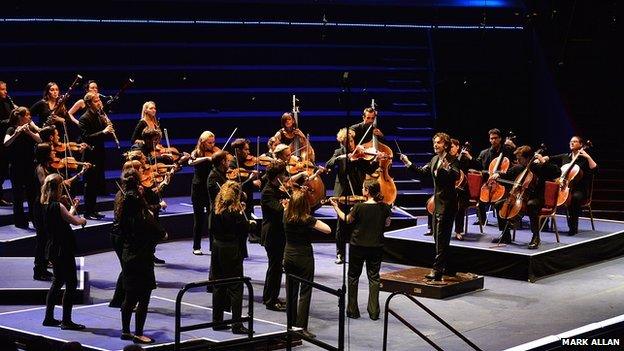
The Aurora Orchestra performing without music at the 2014 Proms
A more useful set of strategies for performers is to vary the interactions with the music, providing different sources of memory in case one source fails.
For example, musicians may write out the score to rehearse their visual memory, or conduct harmonic analyses to strengthen their memory of the music's structures.
Another strategy is to practise the piece starting from multiple points within it. Procedural memories often form as chains of actions, with each action triggering the memory for the next action, and starting anywhere but the beginning of the chain is difficult.
If musicians only practise from the beginning, then any momentary distraction (like an audience cough or ringing phone) can break the action chain, and the memory for the next action won't be triggered. Simply knowing that various starting points are available may reduce anxiety enough that memory slips are less likely to occur.
The demands placed on musicians' memories may physically alter their brains. When hearing familiar music, both musicians and non-musicians activate a key brain area called the hippocampus, but in musicians the activity is higher.
Moreover, musicians have more "grey matter" in their hippocampuses, as do others in memory-demanding professions, such as London taxi drivers who have completed "the Knowledge".
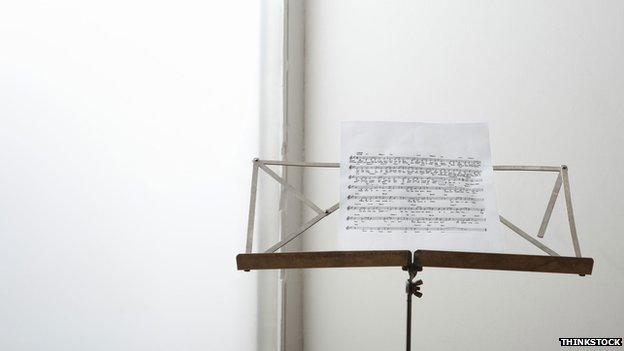
Neuroscientists have found that musical memories can be preserved in the brain even when most other memories are lost. Memory loss, such as that experienced by amnesiacs, provides a window for neuroscientists to study how memory works.
One amnesiac patient, a German professional cellist, had such profound memory loss that he could not remember well-known facts about Germany, nor important details from his youth or adulthood. He had no memory of relatives and friends, except for his brother and his full-time care-giver.
However, he could still play the cello and sight-read music. Moreover, his memory for music from his past was just as good as that of his non-amnesiac colleagues. He could even learn to recognise new music (but not new faces or objects).
Somehow, his musical memory system was intact, even though most of his other memories were gone.
Neuroscientists are still trying to discover why music can be resistant to memory problems. One possibility is that music, like smell, taps into primitive emotional centres in the brain that have widespread connections to other brain areas.
These connections across the brain are what make the memories robust. This wide distribution could also explain why music conjures up rich memories, as for example with a song that hasn't been heard for decades.
Even if expectations of memorisation change, there will no doubt continue to be musicians who feel that memorisation is indispensable to performance. And scientists will be glad, as music provides a rich avenue to study the limits of human memory.
Jessica Grahn is a cognitive neuroscientist and an Assistant Professor at the Brain and Mind Institute at Western University, London, Ontario. She investigates how music affects the brain and behaviour.
Subscribe to the BBC News Magazine's email newsletter, external to get articles sent to your inbox.